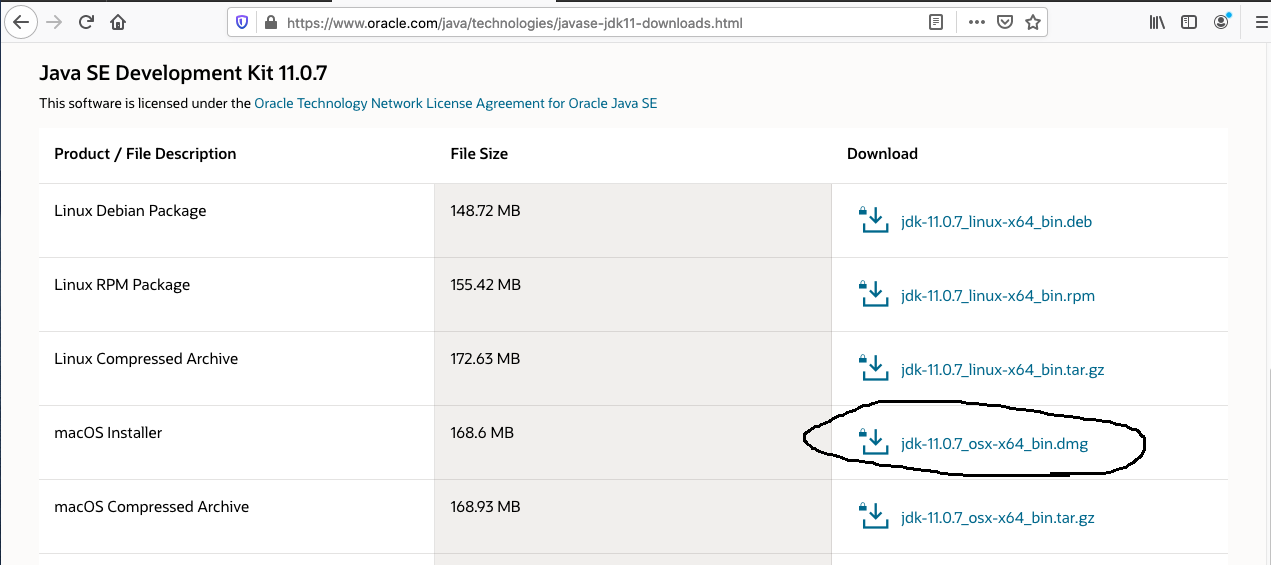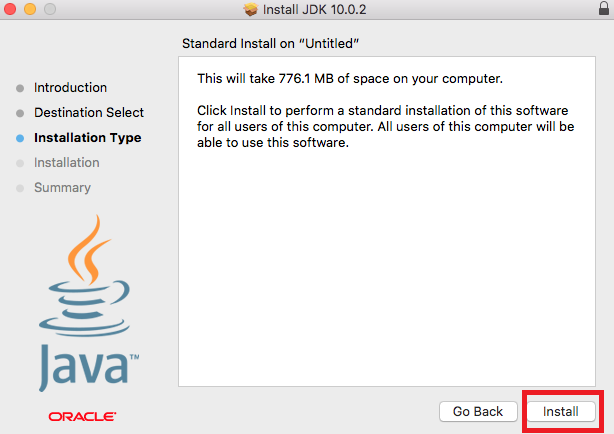
- ORACLE JAVA FOR MAC OS SIERRA HOW TO
- ORACLE JAVA FOR MAC OS SIERRA INSTALL
- ORACLE JAVA FOR MAC OS SIERRA SOFTWARE
- ORACLE JAVA FOR MAC OS SIERRA LICENSE
ORACLE JAVA FOR MAC OS SIERRA INSTALL
If you do not install Java before running an Adobe application, there can be missing or improperly behaving features. At runtime, when you launch an Adobe application, you are prompted to install Java if it is not already installed. Or it can be installed later before you install Adobe applications. Adobe and Apple have worked together to ensure that you can install Java at OS install time.

ORACLE JAVA FOR MAC OS SIERRA SOFTWARE
Since current Adobe installers and applications were built before these changes by Apple, Adobe software anticipates that Java is installed. It is now an optional install that you must select. Apple recently changed the way it includes Java in Mac OS, and with Lion, Java is no longer preinstalled.
ORACLE JAVA FOR MAC OS SIERRA HOW TO
See how to subscribe to this list at the relevant page of official Scilab web site.Many Adobe applications depend on the Oracle Java Runtime Environment (JRE) for some features to work. If you have problems that are not mentioned in this page please use the mailing list. Since the Accelerate framework seems to have a only a partial use of the new M1 features, you may experience different performance between the OpenBLAS and the Accelerate build and depending on the kind of computation the faster may be one or the other. We provide two different builds, the first one uses the default Accelerate Framework (which includes the default macOS Apple provided BLAS and LAPACK library) and the second one uses OpenBLAS (see ). Be also warned that this native build cannot use Atoms modules using C/C++ gateways for the moment since these have to be rebuilt in order to include the libraries for both architectures. Note concerning the native arm64 JDK: If you don't have particular needs for a given version, let Scilab download and install the JDK by itself when it is launched for the first time (it will be downloaded from ). Mac M1 users can also download the native arm64 build below and compare the performance with the x86_64 using Rosetta. Then relaunch Scilab from its icon, and continue the installation. Softwareupdate -install-rosetta -agree-to-license Locate and lauch the "Terminal" application, then type the following on the command line : To solve this you need to install Rosetta from the command line. If you never run such an application on your Mac M1 it will complain when trying to launch Scilab for the first time, with the message: You don't have the permission to open the application "Scilab". Newer Mac M1 machines need the Rosetta 2 binary dynamic translator to execute applications compiled for Intel architecture. This small video shows how to find the /bin folder by using the keys combination Command-Shift-G and then drag and drop /bin/sh in the list of authorized applications.

If Scilab does not show files in the FileBrowser component, you will have to enable the command-line interpreter /bin/sh (which is run just after you double-click on Scilab's icon) in the "Privacy" tab in the System Preferences Control Panel. For example, apps are now required to ask your permission before accessing parts of the drive where documents and personal files are kept. MacOS Catalina introduced new security controls. If you don't have particular needs for a given version, let Scilab download and install the JDK by itself when it is launched for the first time (it will be downloaded from ). Needs a Java Virtual Machine to be run in GUI mode. See the eventual details of installation in the Prerequisitesīuilds available on this page run on macOS High Sierra, Mojave, Catalina andīig Sur, supporting Intel and newer M1 machines.
ORACLE JAVA FOR MAC OS SIERRA LICENSE
The macOS build is distributed under the same license as Scilab, i.e. Ressources for preparing and making available this specific macOS build of Scilab are provided by the University This page aims to bring macOS builds of Scilab (builds for Linux, Windows and general information can be found on Scilab is an Open source software for numerical computations developed by the Scilab Team at ESI and by industry and academic contributors.


 0 kommentar(er)
0 kommentar(er)
